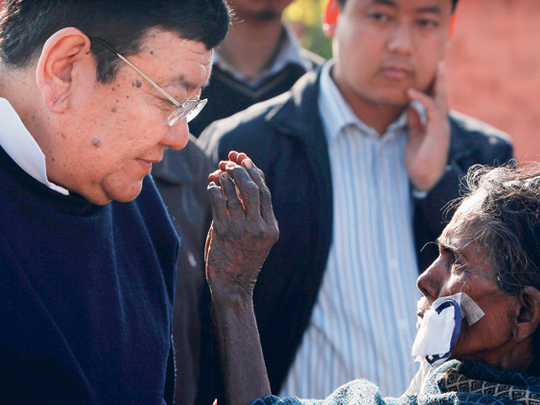
Hetauda, Nepal : Raj Kaliya Dhanuk sits on a wooden bench, barefoot, with a tattered sari covering thin arms as rough as bark. Thick clear tears bleed from her eyes, milky saucers that stare at nothing.
For nearly a year, cataracts have clouded out all sight from the 70-year-old grandmother's world. With no money, she assumed she'd die alone in the darkness. But now she waits quietly outside the operating room for her turn to meet Nepal's God of Sight.
Despite all odds
Dhanuk and more than 500 others — most of whom have never seen a doctor before — have travelled for days by bicycle, motorbike, bus and even on their relatives' backs to reach Dr Sanduk Ruit's mobile eye camp.
Each hopes for the miracle promised in radio ads by the Nepalese master surgeon: He is able to poke, slice and pull the grape-like jelly masses out of an eye, then refill it with a tiny artificial lens, in about five minutes. Free of charge.
It's an assembly-line approach to curing blindness that's possible thanks to a simple surgical technique Ruit pioneered, allowing cataracts to be removed safely without stitches through two small incisions. Once condemned by the international medical community as unthinkable and reckless, this mass surgery ‘in the bush' started spreading from Nepal to poor countries worldwide nearly two decades ago.
And later this year, US military surgeons will train under Ruit for the first time.
Ruit estimates sight has been restored to about three or four million people through his method.
Worse than death
Most of them live in the developing world, where a loss of vision can be worse than death because of the added burden thrust on families already drowning in hardship.
The soft-spoken portly doctor in acid-washed jeans and sneakers guesses he alone has removed 100,000 cataracts over his 30-year career.
"You realise there are drops which make an ocean," Ruit, 55, an ethnic Sherpa who grew up poor in a remote mountain village on the border near Tibet, said.
"They're such wonderful cases that make you fully convinced of the power of the work."












